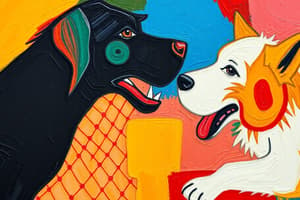Podcast
Questions and Answers
What did Pavlov's dogs learn during his conditioning experiments?
What did Pavlov's dogs learn during his conditioning experiments?
- They learned to bark.
- They learned to roll over.
- They learned to fetch.
- They learned to salivate at the sound of a bell. (correct)
Who conducted the 'Little Albert' study?
Who conducted the 'Little Albert' study?
John B. Watson
What is the goal of the researcher in a classical conditioning experiment?
What is the goal of the researcher in a classical conditioning experiment?
To teach the subject to respond to the conditioned stimulus
A stimulus that naturally provokes a behavior or response is known as a(n) __________.
A stimulus that naturally provokes a behavior or response is known as a(n) __________.
What is responsible for the gradual diminishment of the association between a conditioned stimulus and a conditioned response?
What is responsible for the gradual diminishment of the association between a conditioned stimulus and a conditioned response?
Which learning process strengthens a connection between a stimulus and a response as learning begins?
Which learning process strengthens a connection between a stimulus and a response as learning begins?
How does advertising use classical conditioning to sell products?
How does advertising use classical conditioning to sell products?
A neutral stimulus causes no response.
A neutral stimulus causes no response.
In classical conditioning, the __________ stimulus causes an unconditioned response.
In classical conditioning, the __________ stimulus causes an unconditioned response.
What is the conditioned response (CR) in Edward's study scenario?
What is the conditioned response (CR) in Edward's study scenario?
Spontaneous recovery is usually a permanent reappearance of a conditioned response.
Spontaneous recovery is usually a permanent reappearance of a conditioned response.
Conditioning occurs when two events that usually go together become associated with each other.
Conditioning occurs when two events that usually go together become associated with each other.
Classical conditioning occurs when the unconditioned stimulus evokes a response from a neutral stimulus.
Classical conditioning occurs when the unconditioned stimulus evokes a response from a neutral stimulus.
When a response becomes generalized, a person will react to things that remind them of the original stimuli.
When a response becomes generalized, a person will react to things that remind them of the original stimuli.
Watson's 'Little Albert' experiment demonstrated which pairing of classical conditioning processes?
Watson's 'Little Albert' experiment demonstrated which pairing of classical conditioning processes?
Higher-order conditioning occurs when a conditioned response acts as an unconditioned response.
Higher-order conditioning occurs when a conditioned response acts as an unconditioned response.
Edward Thorndike's law of effect was a precursor to the theory of __________.
Edward Thorndike's law of effect was a precursor to the theory of __________.
Who believed that behaviors followed by favorable consequences tend to be repeated?
Who believed that behaviors followed by favorable consequences tend to be repeated?
In operant conditioning, acquisition is the __________.
In operant conditioning, acquisition is the __________.
In operant conditioning, food is an example of a __________ reinforcer.
In operant conditioning, food is an example of a __________ reinforcer.
Stimulus discrimination occurs when an organism generalizes one consequence to many stimuli similar to the discriminative stimulus.
Stimulus discrimination occurs when an organism generalizes one consequence to many stimuli similar to the discriminative stimulus.
Which process of operant conditioning has Thor demonstrated when he did not fetch the ball after hearing 'Pineapple'?
Which process of operant conditioning has Thor demonstrated when he did not fetch the ball after hearing 'Pineapple'?
Reinforcement attempts may not work if the reinforcer is not important or valued by the subject.
Reinforcement attempts may not work if the reinforcer is not important or valued by the subject.
Classical conditioning occurs when a particular behavior is reinforced by its consequences.
Classical conditioning occurs when a particular behavior is reinforced by its consequences.
Which invention by B.F. Skinner allowed him to train subjects through operant conditioning?
Which invention by B.F. Skinner allowed him to train subjects through operant conditioning?
In operant conditioning, many complex behaviors are learned through shaping.
In operant conditioning, many complex behaviors are learned through shaping.
What happened to the cats after receiving a reward for escaping the puzzle box?
What happened to the cats after receiving a reward for escaping the puzzle box?
The continued display of a behavior after reinforcement has been removed is known as ___________.
The continued display of a behavior after reinforcement has been removed is known as ___________.
Flashcards are hidden until you start studying
Study Notes
Classical Conditioning
- Pavlov's dogs learned to salivate at the sound of a bell, demonstrating conditioned responses.
- John B. Watson conducted the "Little Albert" study, conditioning an infant to fear white rats.
- The goal of classical conditioning experiments is to teach subjects to respond to the conditioned stimulus.
- An unconditioned stimulus naturally provokes a behavior or response without prior learning.
- Extinction is the gradual diminishment of the association between a conditioned stimulus and a conditioned response.
- Acquisition involves strengthening the connection between a stimulus and response as learning takes place.
- Advertising employs classical conditioning by associating products with positive emotions.
Key Concepts in Conditioning
- A neutral stimulus does not invoke any response until it becomes associated with an unconditioned stimulus.
- In classical conditioning, an unconditioned stimulus elicits an unconditioned response.
- Craving soda and coffee during exams represents the conditioned response (CR) in a scenario where these drinks were present during study time.
- Spontaneous recovery does not guarantee a permanent reappearance of a conditioned response.
- Generalization occurs when reactions extend to stimuli that remind an individual of the initial stimulus.
Advanced Conditioning Processes
- Watson's experiment illustrated generalization and acquisition as significant classical conditioning processes.
- Higher-order conditioning involves a conditioned response becoming associated with new stimuli but doesn't transform a conditioned response into an unconditioned one.
- Edward Thorndike's law of effect laid the groundwork for operant conditioning principles.
- B.F. Skinner emphasized that behaviors followed by favorable consequences are likely to be repeated.
Operant Conditioning Insights
- In operant conditioning, acquisition refers to the moment a behavior is linked with a specific consequence.
- Primary reinforcers, such as food, fulfill essential needs and drive behavior change.
- Stimulus discrimination happens when an organism responds specifically to a discriminative stimulus rather than generalizing across similar stimuli.
- Glen’s failed attempt to train his dog illustrates stimuli discrimination when the dog does not associate the command "Pineapple!" with fetching.
Reinforcement and Learning
- Reinforcement efforts may fail if the reinforcer lacks importance or value to the subject.
- Classical conditioning does not involve reinforcing behaviors through consequences.
- Skinner invented the operant chamber as a tool for training subjects via operant conditioning.
- Shaping is essential in operant conditioning for developing complex behaviors through gradual reinforcement.
- Cats rewarded for escaping a puzzle box learned to escape more quickly, reflecting the principle of learning from consequences.
- Resistance to extinction is the persistence of behavior after reinforcement has ended, indicating learned behaviors can endure challenges.
Discriminative Stimulus
- The discriminative stimulus in operant conditioning indicates the likelihood of a consequence, guiding behavior appropriately.
Studying That Suits You
Use AI to generate personalized quizzes and flashcards to suit your learning preferences.




